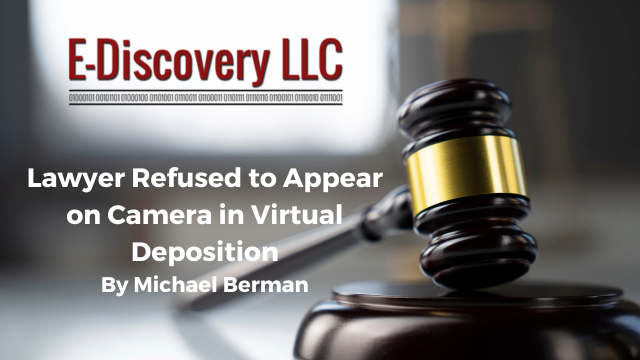
[EDRM Editor’s Note: The opinions and positions are those of Michael Berman.]
In Client escapes sanction for lawyer’s refusal to appear on camera in Zoom deposition (abajournal.com)(Jan. 25, 2024,), Debra C. Weiss reported on Agnone v. Agnone, 2024 WL 242488 (Cal. App., 2d Dist., Jan. 23, 2024)(unreported). She wrote:
The opinion described what happened at the deposition.
[Attorney] Katofsky was in the same room as his client during the deposition. The client appeared on camera, but Katofsky refused to turn on his webcam. The lawyer for Shawn Agnone complained that he wouldn’t be able to see whether Katofsky was “making any visual signs” or “otherwise coaching” his client.
Katofsky referenced the subpoena notice, which required Katofsky and his client to participate in a Zoom deposition “using their own computer equipped with a webcam, and with a stable landline/wired ethernet connection to the internet.”
Katofsky told the opposing lawyer that his computer was equipped with a webcam, “so we complied with your notice,” according to the opinion.
Debra C. Weiss, Client escapes sanction for lawyer’s refusal to appear on camera in Zoom deposition (abajournal.com)(Jan. 25, 2024,)
The discovering party ended the deposition, moved to compel, and for sanctions. The parties settled and the motion to compel was withdrawn.
Because the trial court did not enter an order against Madick compelling him to testify, it had no authority to impose sanctions under section 2025.480, subdivision (j).
Agnone v. Agnone, 2024 WL 242488 at 4 (Cal. App., 2d Dist., Jan. 23, 2024)(unreported).
The trial court’s award of sanctions was reversed because no court order was violated. The appellate court wrote: “Because the trial court did not enter an order against Madick compelling him to testify, it had no authority to impose sanctions under section 2025.480, subdivision (j).” 2024 WL 242488 at *4.
The ABA article reports:
Katofsky told the ABA Journal that the appeals court made the right decision. He also says as a lawyer, he doesn’t have to be on camera in a deposition.
“I have no interest in ever being on camera. Ever,” he says.
“No lawyer has to be on camera,” he says. “It’s completely inappropriate to demand it. If they were worried about seeing me, they could have taken the deposition in person.”
Debra C. Weiss, Client escapes sanction for lawyer’s refusal to appear on camera in Zoom deposition (abajournal.com)(Jan. 25, 2024,)
The deposition was one of a third party, Mr. Madick, not one of the divorcing spouses. 2024 WL 242488 at *1. The court wrote:
Madick appeared for the deposition via webcam. His attorney, Jeffrey Katofsky, stated his appearance and confirmed he was in the same room as Madick, but refused to turn on his webcam. Shawn’s attorney objected, explaining he could not tell if Katofsky was “making any visual signs” or otherwise coaching Madick “to answer one way or another.” He then asked Katofsky either to turn on his webcam or to sit next to Madick where they could be seen on the same camera. Katofsky refused through repeated attempts to meet and confer, ultimately stating: “Your notice requires my computer to be equipped with a webcam. My computer is equipped with a webcam; so we complied with your notice.” “I am not going to turn on my webcam because I don’t need to have my webcam on.” Shawn’s attorney terminated the deposition.
Agnone v. Agnone, 2024 WL 242488 (Cal. App., 2d Dist., Jan. 23, 2024)(unreported).
Witness coaching in remote depositions has been an issue. See If You’re Going to Coach a Witness and Misrepresent it to the Court, Turn Off the Recorder (Jan. 10, 2024). The ABA has addressed the issue and discussed a series of safeguards. ABA Formal Opinion on Misconduct in Virtual Depositions (Nov. 16, 2023). One might consider asking Mr. Katofsky’s client “has your attorney signaled or communicated to you in any way during this deposition?”
In light of Agnone, appearance on camera might be a topic for discussion prior to a deposition or for additional provisions in a notice of deposition.


